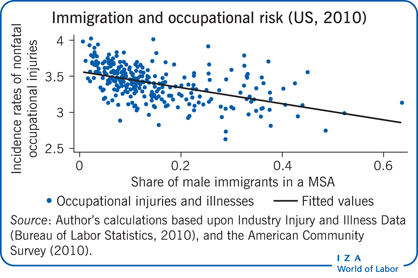Elevator pitch
Public debate on immigration focuses on its effects on wages and employment, yet the discussion typically fails to consider the effects of immigration on working conditions that affect workers’ health. There is growing evidence that immigrants are more likely than natives to work in risky jobs, as they are more inclined to take on physically intensive tasks. Recent studies show that as immigration rises, native workers are pushed into less demanding jobs. Such market adjustments have positive impacts on the health of the native workers.

Key findings
Pros
Immigrants are more likely to work in risky, physically intensive jobs.
Immigration can push native workers into jobs that involve better schedules, lower injury and fatality rates, and which are less physically intensive.
There is evidence of positive effects on native workers’ health and subjective well-being. Improvements in natives’ average working conditions and workloads help to explain the effect of immigration on health.
These effects are concentrated on the most vulnerable individuals, i.e., low-skilled, blue-collar workers.
On balance, evidence does not indicate significant detrimental effects on the average wage of native workers.
Cons
The self-selection of immigrants into riskier jobs contributes to their health deterioration.
Immigration increases safety-related costs due to language barriers and different standards of job safety.
If immigrants perceive their jobs more positively than natives, they may take excessive risks.
There is some evidence of short-term negative effects on low-skilled wages and employment.
The short-term negative effects on wages and employment may have negative effects on health.